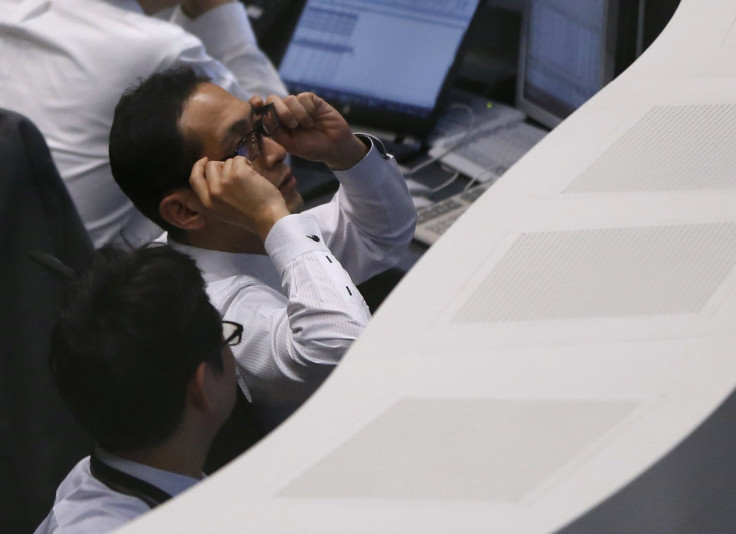Stocks Extend Drop In Tokyo As Investors Boost Japan Bonds, Yen

Japanese stocks fell further Wednesday morning after their biggest drop in three years, ignoring a late-day rally in the U.S. markets as worried local and global investors flocked to Japan bonds and the yen.
Tokyo's Nikkei 225 stock index fell 0.9 percent, reversing an opening-bell rise. Australia's ASX 200 fell 1.1 percent. Singapore's financial markets reopened after Lunar New Year holidays and the STI rose 2.5 percent. China, Hong Kong, Taiwan, South Korea and Vietnam remain closed.
In the U.S., the Dow Jones Industrial Average, Standard & Poor's 500 and Nasdaq Composite closed 0.7 percent to 0.4 percent lower Tuesday after slumping more that 1 percent.
The Nikkei 225 it dropped 5.5 percent on Tuesday to its lowest since mid-2013 as government bond yields turned negative, meaning investors were willing to buy the bonds at a price where they would lose some money rather than buy riskier assets, such as stocks. Together with bonds, the yen is also rising as global investors bet Japan's large economy and high personal savings rate make the country a safe haven. But a strong yen is bad for export-oriented Japanese companies.
"The yen is a funding currency and (the exchange rate) is falling hard as investors bail out of risky trades," CNBC quoted Kathy Lien, managing director of FX Strategy for BK Asset Management, as saying. "Yen strength comes at significant costs for Japan because as an export-dependent nation, many Japanese industries live and die by the value of the yen."
Tuesday's sell-off in Japan came after European and U.S. stocks dropped, led by banks from Deutsche Bank in Germany to Citigroup in the U.S. There was speculation that Deutsche and other banks would find it difficult to maintain profit levels amid falling interest rates and even default on some debt as global economic weakness pushes some borrowers to bankruptcy.
Some analysts believe these concerns are overblown but that fear has taken over.
“It’s quite a tussle between the bulls and bears,” Bloomberg reported John Carey, a Boston-based fund manager at Pioneer Investment Management Inc., as saying. “Some people think this is a temporary setback and that the market maybe got a little ahead of itself — that nothing is really wrong with the economy and this is a good buying opportunity. Others think the market is indicating a slowdown in months ahead.”
The low interest rate and slowing global growth themes were underscored by the Bank of Japan's surprise cut of its interest rates to negative on Friday, its latest attempt to breathe more life into the world's third-largest economy. After the U.S. Federal Reserve raised interest rates in December for the first time since the global financial crisis, underlining its confidence in the economy, many investors expected four more increases starting March this year. That sentiment has changed and investors will be listening to Fed Chairwoman Janet Yellen when she testifies in Congress Wednesday. While low U.S. rates could help the U.S. economy, it usually weakens the dollar, making it tougher for Japan, China and other countries to sell to Americans.
“There is not too much Yellen could say to further reduce market expectations for Fed activity, given how low they already are,” Bloomberg reported Kymberly Martin, a markets strategist in Wellington at Bank of New Zealand Ltd., as saying, referring to the outlook for further rate hikes in the U.S. “Conversely, if Yellen chooses to focus on the improvement in earnings growth and the decline in the unemployment rate shown in Friday’s U.S. labor market report, there is some potential for U.S. yields to find support, or rebound.”
© Copyright IBTimes 2024. All rights reserved.




















